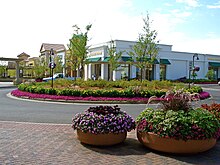This article needs to be updated. (March 2015) |
A lifestyle center (American English), or lifestyle centre (Commonwealth English), is an open-air shopping center which aims to create a "pedestrian-friendly, town-like atmosphere with sidewalks, landscaping, ambient lighting, and park benches.[1] Memphis developers Poag and McEwen are generally credited with developing the concept in the late 1980s.[1] Lifestyle centers emerged as a major retailing trend in the late 1990s. Sometimes labeled boutique malls or ersatz downtown, they are often located in affluent suburban areas.


History
editThe proliferation of lifestyle centers in the United States accelerated in the early 21st century, growing from 30 nationally in 2002 to 120 at the end of 2004.[2] They lie on the upscale end of commercial development, with discount-based outlet malls on the low end.
Design
editLifestyle centers typically require less land and may generate higher revenue margins, generating close to $500 per square foot, compared to an average of $330 per square foot for a traditional mall, according to the president of Poag and McEwen.[2] Other advantages lifestyle centers have over traditional enclosed malls are savings on heating and cooling and quicker access for customers.[1]
Unlike the traditional commercial layout of strip shopping centers, lifestyle centers present their formal storefronts as facing each other across a landscaped pedestrian walkway or a low volume two-lane road. Those with a more extensive street grid or more multifunctional and dense development include offices, hotels, residential, retail, and entertainment, often with a designated function to act as the community's center.[3] One of the earliest proponents of lifestyle centers was RED Development, which built centers primarily in the Midwest and Southwest United States.[3]
See also
editReferences
edit- ^ a b c Donnellan, John (2014). Merchandise Buying and Management (4th ed.). New York: Fairchild Books. p. 63. ISBN 9781609014902. Retrieved February 27, 2023.
- ^ a b Bhatnagar, Parija (2005-01-11). "CNN article: "Not a mall, it's a lifestyle center"". Retrieved 2006-05-26.
- ^ a b Lipp, Linda (February 18, 2004). "Fort Wayne, Ind., Pioneered 'Lifestyle' Shopping Center Trend in U.S." Ft. Wayne News-Sentinel. Retrieved 12 November 2018.
External links
edit- "List of lifestyle centers", USA Today, January 31, 2007